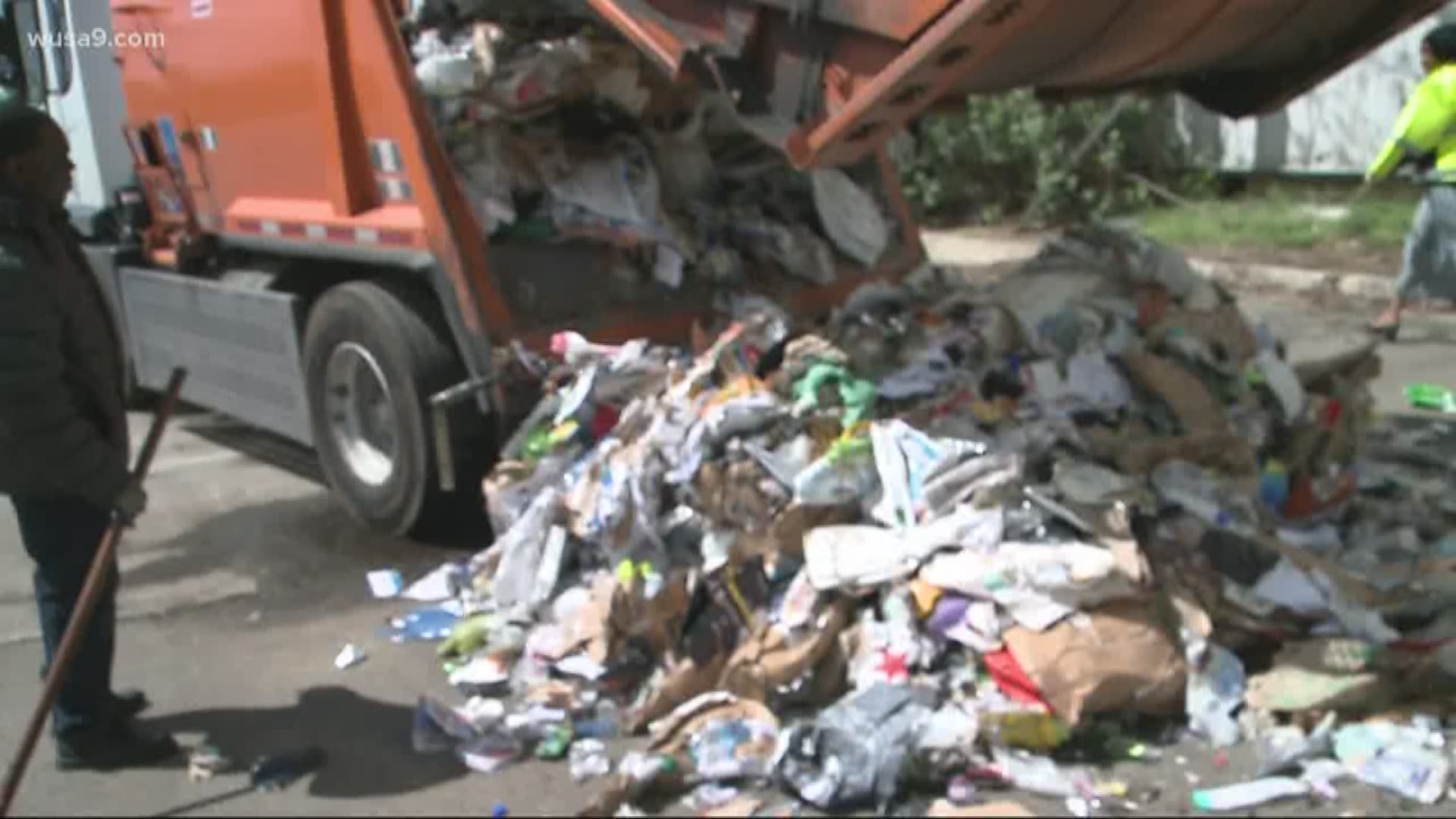QUESTION:
Does everything you put out at the curb in DC really get recycled?
ANSWER:
Yes, if it is actually a recyclable item.
SOURCES:
DC Department of Public Works
Waste Management
PROCESS:
WASHINGTON -- One of our Verify viewers was skeptical about what's happening with his recycling.
Whether you live in D.C., Maryland or Virginia, putting stuff on the curb to be recycled is costing local governments a lot of money..and more people are doing it.
Like in D.C. the number of recyclables being processed is up 10% from the previous year.
But is everything you put out on the curb actually being recycled?
The Verify team took Northeast D.C. resident, Tim Dowdy, on a road trip to get answers.
The DC Department of Public Works explained to Verify researchers, all the stuff you put in your curbside recycling in D.C., Maryland and Virginia first it goes to one of two local transfer stations, Benning Road or Fort Totten.
So that was our first stop, the Benning Road Station where we met with D.C. Public Works Director, Chris Geldart.
“I’m looking for some insights of what I can do better,” Verify viewer Tim Dowdy told Geldart.
DC DPW showed the Verify team one of their trucks on its recycling route, allowing them to go through it and look at some of the materials that have come in.
“Right off the bat, don't put your recycling in plastic bags. These plastic bags when they get out to the sorting facility they get all tangled up inside the sorting facility. They have to shut down, clean it out,” Geldart explained.
"And actually, inside this bag that’s a bunch of diapers,” Geldart continued. Geldart said diapers definitely should always go in the waste.
Next up, we found a piece of patio furniture, another big no-no for recycling.
“What about the plastic water bottle lids?”, the DC resident asked, after finding the items while sifting through the materials.
Geldart said plastic water bottle lids can be recycled.
The second leg of the Verify trip followed the same route those DC recycling trucks make every day, to Waste Management's recyclables sorting facility in Elkridge, Maryland.
90% of all the material processed at Waste Management facility is from a municipal curbside program that covers the following counties: Washington D.C., Baltimore City, Howard County, Anne Arundel County, Carroll County and Frederick County.
“When I do something and put it in a bin and it comes here, what happens?”, Dowdy asked.
Mike Taylor, Director of Recycling Operations at Waste Management told us here is where we see the material as it comes off a truck. They go through the process of first trying to remove items that shouldn’t be in the recycling bin in the first place.
Taylor showed some of the items that end up in at the facility and the issues they cause.
“Wire, string, tanglers…this type of material is going to get wrapped in one of the machines or present a hazard to one of the employees that will be looking to pull this off the conveyor belt…” the director explained.
He also said they get non-recyclable items at the facility like soccer balls, golf balls, bowling balls hundreds of times per day.
“Question I want to know is, is what actually happens to the plastic bottle that I put into the recycling bin when I let go of it?” the Verify viewer asked.
Taylor said it actually ends up going to a mill in South Carolina that then breaks that plastic bottle down into pellets and then converts that pellet and spins it into a fabric or material like carpet or like a textile for a shirt that you wear on your back.
So how exactly does Waste Management find those people find that want to buy those materials?
Well, since Waste Management is a publicly traded national company, they have a whole team of people across in different regions of the country that conduct face-to-face interaction with companies that are looking for the material generated in the U.S.
As an alternative for plastic bags, Waste Management officials suggest bringing them to retailers and grocery stores that have receptacles to take those bags back. However, do not put them in your household regular recycling bin.
What about glass? Does it really stay out of a landfill?
Taylor explained, glass should end up a glass recycle facility that converts a bottle to a bottle. There are companies out there that do that, regionally.
“I think the biggest takeaway is that while your motivation may be in the right place, your heart, you want to make the right choice, you can do more damage than I was originally aware of…everybody has to do their part," Dowdy said. "If I’m not doing things the right way or ineffectively then I'm hurting the whole process."
So, does DC recycle what residents put into the blue bin?
We verified that is true.
However, more than 18% of the stuff people are putting in their recycling bins doesn't belong there.
Remember, do not put plastic trash and grocery bags in recycling also items like soccer balls, Christmas lights, extension cords, diapers--those just go in the garbage.
For more information about your local county program recycling and how you can do a better job of reducing the overall contamination rate, click here.

